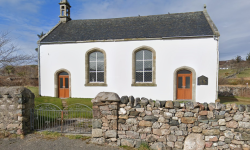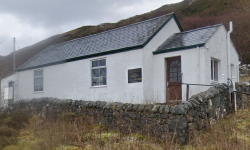George Brodie of Eddrachillis
George Brodie was licensed by the Presbytery of Inverness on 15th Sept. 1714, ordained by the Presbytery of Caithness to the Durness charge the following year and translated to Eddrachllis in 1724 as the first minister of that Parish which had been newly instituted by the General Assembly of 1722. Not a great deal is known about Mr Brodie. His successor in Durness, Murdo Macdonald, is said to have “entertained the highest respect” for him and that he was often mentioned in a positive light in Macdonald’s diary1. He was “singular as a man of prayer”2 which was still a tradition in the north many generations after he passed away, indeed as late as the end of the 19th century.3 Dr Mackintosh Mackay of Dunoon was a great-grandson. His son-in-law George Mackay succeeded him as minister of Eddrachillis but survived only two months after his ordination.
An entry from Mr Macdonald’s diary of March 1740, written at Badcall, Edderachllis, records the unexpected death of Mr Brodie:
One of those alarms which I have got this week at the expense of others was by the sudden and surprising death of the minister of this place, who departed this life Sabbath last in a manner which should be as instructive as it was stunning. He was taken ill in his bed some night of the last month when turning speechless (overwhelmed, it seems, with blood), he surprised his wife and family who were in the utmost confusion for some hours, till, after calling the neighbourhood, he recovered his speech, and being bled he was mending as to health after some days’ illness to such a degree that be was offering to preach last Lord’s day, had he not the help of a probationer his friend. He did eat, and drink, and talk that morning in pretty good health of body and soundness of mind, projecting to go to the Presbytery a few days thereafter, and sent me word (which I got the very at evening of the day whereon he died) to that purpose. At his own desire he was left alone in the house, the rest having gone to church by his positive order, but when towards the close of worship two of the women of the house came to kindle fires, &c., they found him dead; upon which one of them went to give the alarming news in the congregation, who upon the last psalm poured out of the kirk and found him as they were told.4
Rev J.S Mackay wrote concerning the background of his moving to Edderachiilis:
Every tradition of him, and written notices still extant, show him to have been pre-eminently a man of prayer, able and cultured as well, and greatly interested in the spiritual instruction and well-being of his people. A few years’ experience led him also to see that it was altogether beyond the power of any individual minister to satisfactorily overtake the work required. He therefore moved in the same direction as Mr. Mackay [Rev John Mackay of Lairg], but first brought the matter before the Presbytery and Assembly of the Church. The Assembly acquiesced, and ordained a collection over the whole Church, to help to make provision for two additional ministers. Authority was also given to Mr. Brodie and the Presbytery, and an action raised before the Lords of Council and Session at their instance, and that of the Advocate-Procurator of the Church, for the disjunction of the parish into the three parishes of Tongue, Durness, and Edderachilis, with the limits of each respectively defined. The disjunction was effected in 1724; and the general collection made amounted to £1800. Lord Reay, who was member of the Assembly at which this was announced, undertook, on condition of receiving this money, to erect suitable ecclesiastical buildings, assign glebes, and contribute so much yearly as stipend to the ministers of the new charges. This arrangement being satisfactorily completed, Mr. Brodie elected to move from Durness and become minister of the newly erected parish of Edderachilis.5
The following is an extract of the Presbytery of Inverness record of their meeting of 24 Sept. 1714:
To all which questions the said Mr Brodie gave full and satisfying answers, and he having signed the formula and the Synod in April last being acquainted that he was upon tryals, and it being above six years since he past his course at the college, and having the Irish language, and the Presbytery not only having satisfaction in all parts of his tryals, but persuaded that he is a serious good young man, having a sense of religion upon his soul, therefore they did receive him as a probationer to preach the gospel within their bounds.6
Earlier Presbytery records show that his tryals were delayed by illness earlier in the year. His year of birth is not known but it would appear from their stating that he was a young man, and that he had passed his college course six years before, that he would be about in his mid-twenties which would mean that he was likely born, approximately, about 1689.
Footnotes
1. R. Mackay, History of the House of Mackay, p518.
2. Hew Morrsion, Trans. of the Gaelic Soc. Inverness, vol 11, p
3. Ibid.
4. Ibid.
5. J.S. Mackay, Sutherland and the Reay Country, 1897.
6. Minutes of the Presbytery of Inverness, http://www.scotlandsplaces.gov.uk/.

